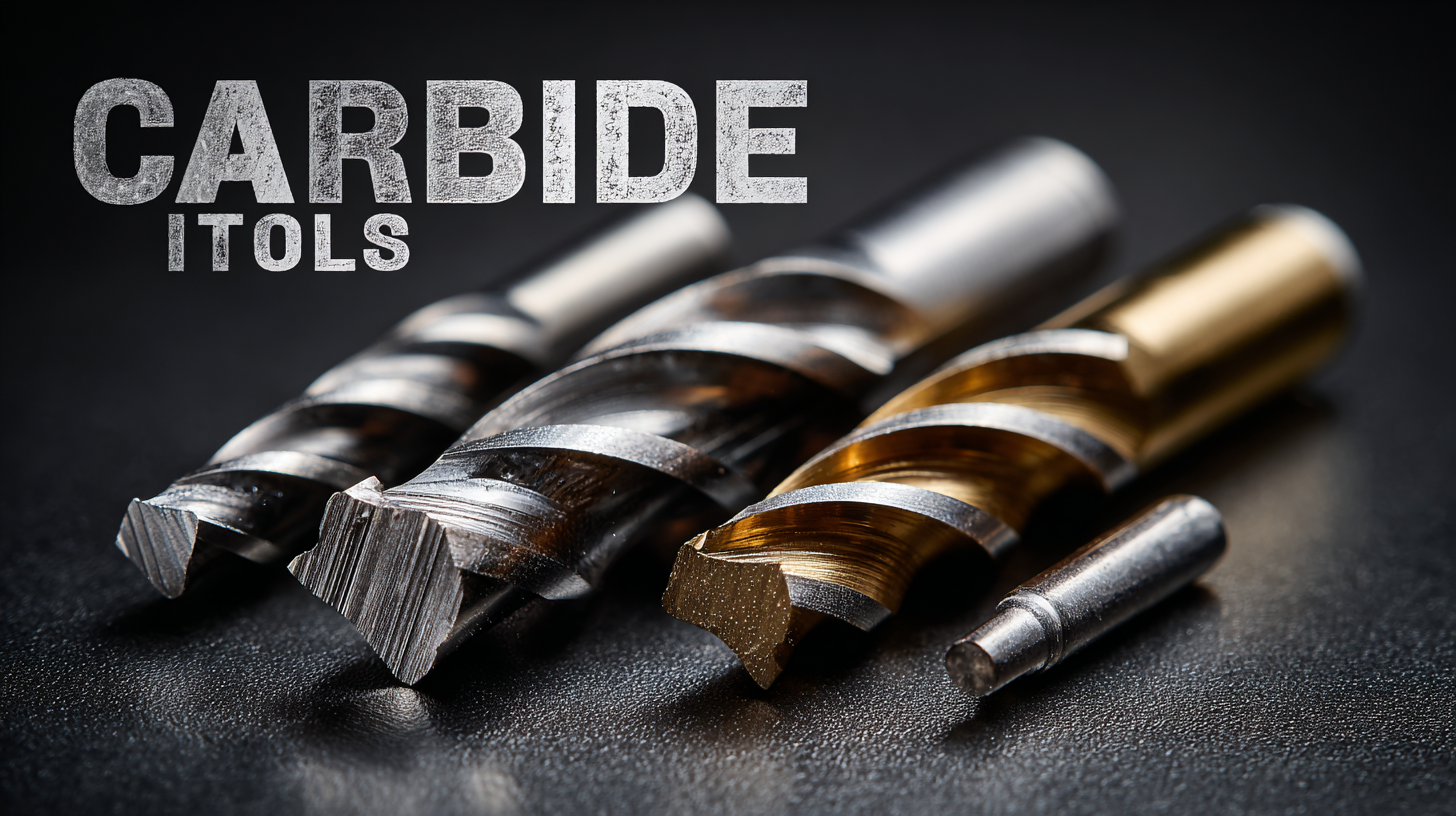SUNDI TOOLS
- Copyright © Wuxi Sundi Precision Tools Co.,LTD All rights reserved.
- Site Map
In today's competitive manufacturing landscape, the importance of selecting the right tools cannot be overstated, particularly when it comes to precision work. Carbide Cutting Tools, known for their durability and ability to maintain sharp edges, play a crucial role in enhancing productivity and ensuring high-quality results. According to a report by MarketsandMarkets, the global carbide tools market is anticipated to reach $22.7 billion by 2026, driven by the increasing demand for precision machining in various industries including automotive, aerospace, and electronics. As China's manufacturing sector continues to thrive, it emphasizes the significance of "China manufacturing, winning respect in the world with quality." Choosing the best carbide cutting tools not only boosts operational efficiency but also reflects a commitment to excellence that can resonate with global standards.

When selecting carbide cutting tools, one of the most critical steps is identifying reputable manufacturers. Quality is paramount, and this begins with understanding the key features that distinguish top-tier products. Look for manufacturers that utilize high-grade cobalt, tungsten, and other durable materials in their tool production. This not only enhances the tool’s longevity but also significantly improves its cutting performance. Additionally, it’s essential to consider the manufacturing process; companies employing advanced techniques, such as precision grinding and rigorous quality control, typically produce more reliable tools.
Another vital aspect to consider is the manufacturer's commitment to innovation. Leading carbide cutting tool manufacturers often invest in research and development, continuously improving their products to meet industry demands. This includes offering a variety of tool geometries and coatings, which can elevate their effectiveness for specific applications. Furthermore, assess the manufacturer’s reputation through customer reviews and industry certifications. A company that prioritizes feedback and adheres to high standards is more likely to deliver cutting tools that meet or exceed your precision work requirements. Quality assurance practices, such as thorough testing and guarantees, are also indicators of a trustworthy manufacturer.
When choosing carbide cutting tools for precision work, understanding the material composition of tungsten and cobalt is crucial. Tungsten carbide is renowned for its hardness and wear resistance, making it ideal for cutting applications. The addition of cobalt enhances toughness and bonding characteristics, creating a resilient tool capable of withstanding the rigorous demands of machining. Recent advancements in surface treatment processes have emphasized the importance of optimizing tool surface properties to meet modern low-carbon manufacturing requirements. Such treatments can significantly improve the tool's performance and lifespan.

Tips for selecting the right carbide cutting tool include ensuring that the tungsten-cobalt ratio aligns with the intended application, which can vastly affect the tool's durability. Additionally, consider tools with advanced coatings, such as TiAlN, which can protect against wear and heat, thereby prolonging tool life. For those interested in customized solutions, additive manufacturing is proving effective in producing tailored carbide tools, offering flexibility in design and material composition to meet specific machining needs.
 When it comes to precision work, selecting the appropriate carbide cutting tools is crucial for achieving the best results. Different applications and processes necessitate distinct tool characteristics, making it vital to match the right tool to specific precision requirements. For instance, ultra-precision diamond cutting has emerged as a promising technique for machining titanium alloys like Ti6Al4V, which demands significant cutting energy and specific tool interactions. Utilizing advanced coatings, such as PFPE on diamond tools, can drastically improve the performance and efficiency of these processes, minimizing wear and enhancing surface finish.
When it comes to precision work, selecting the appropriate carbide cutting tools is crucial for achieving the best results. Different applications and processes necessitate distinct tool characteristics, making it vital to match the right tool to specific precision requirements. For instance, ultra-precision diamond cutting has emerged as a promising technique for machining titanium alloys like Ti6Al4V, which demands significant cutting energy and specific tool interactions. Utilizing advanced coatings, such as PFPE on diamond tools, can drastically improve the performance and efficiency of these processes, minimizing wear and enhancing surface finish.
Additionally, the complexities involved in machining difficult-to-machine alloys call for advanced tool materials and coatings. Tools made from solid-carbide provide an excellent choice for applications ranging from drilling to milling, particularly in environments that require high durability and heat resistance. As industries increasingly adopt multi-material additive manufacturing techniques, understanding the nuances of carbide tools becomes even more critical. Matching the right carbide tools to the demands of precision tasks ensures that manufacturers can meet performance standards while navigating the challenges inherent in modern manufacturing processes.
When it comes to selecting carbide cutting tools for precision work, one crucial distinction arises: coated versus uncoated tools. Coated carbide tools are designed with an additional layer that enhances their performance and durability. Common coatings include titanium nitride and aluminum oxide, which provide better wear resistance and lower friction during machining. This capability means that coated tools can often operate at higher speeds and with greater efficiency, leading to improved productivity and longer tool life.
On the other hand, uncoated carbide tools maintain their bare form, which can be a wise choice in specific applications. They tend to be more cost-effective for users who engage in less demanding tasks and where overheating is not a significant risk. However, the lack of a protective coating may result in a shorter lifespan, especially in high-speed applications or when machining harder materials. It’s essential for manufacturers to evaluate their specific machining conditions and material types to determine which option best suits their needs, balancing costs with the potential benefits of increased efficiency and tool longevity.
When selecting carbide cutting tools for precision work, understanding the industry standards and certifications that ensure reliability and safety is crucial. Recent achievements in quality management, such as the AS9100 certification obtained by RIA-JMTC, underscore the importance of adhering to high standards within the aerospace sector. This certification reflects a commitment to excellence in quality management systems, which can be a valuable benchmark for tool manufacturers and users alike in assessing the reliability of the tools they choose.
In many industries, including aerospace, oil and gas, and food safety, there is an increasing emphasis on compliance with established standards to reduce risks and enhance operational safety. Tools that meet these stringent certifications not only assure users of their quality but also contribute to a safer working environment. Additionally, understanding the ISO 9000 standards and their application can help manufacturers and end-users alike to navigate the complex landscape of tool selection, ensuring that the carbide cutting tools utilized in their operations meet the required safety and reliability expectations.
| Tool Type | Material | Coating Type | Applications | Certification Standards |
|---|---|---|---|---|
| End Mill | Carbide | Titanium Nitride | Milling operations, Slotting | ISO 9001, ANSI B107 |
| Drill Bit | Cobalt Steel, Carbide | Black Oxide | Drilling metals, Plastics | ISO 2768, ANSI B94.11 |
| Turn Tool | Carbide | CVD Coating | Lathe Turning, Profiling | ISO 9001, ASME B5.30 |
| Reamer | Carbide | TiAlN Coating | Precision Holes, Finishing | ISO 9001, ANSI B94.5 |
| Saw Blade | Carbide | TCT Coating | Cutting Wood, Plastics | ISO 9001, ANSI B107.9 |